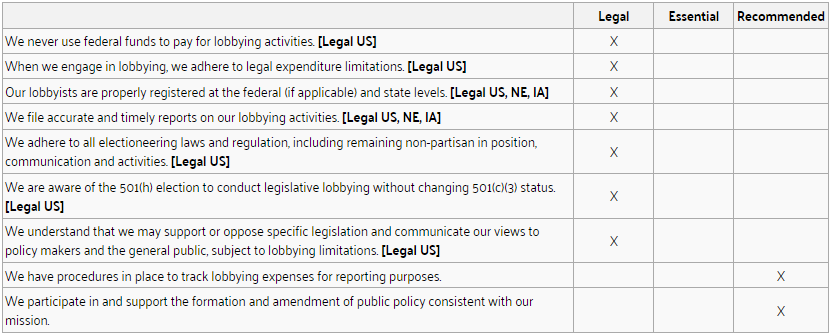Guidelines and Principles
Public Policy & Advocacy
Nonprofit organizations play a central role in the democratic process by providing a means for public participation and promotion of the common good. As entities that serve the public, nonprofit organizations should engage in public policy and advocacy activities to promote constituent, organizational and sector interests. Nonprofits should work to promote broad public participation in public policy and advocacy efforts and should provide assistance to the public in these efforts.
Assessment Items
Advocacy

Lobbying

Resources
- 501(h) election, if conducting any lobbying (Internal Revenue Code §501(c) (3), §501(h)) US
- Compliance with lobbying reporting requirements (Lobbying Disclosure Act of 1995; Neb. Rev. Stat. §49-1483.03; Iowa Code §68B.37; 990) US, NE, IA
- Compliance with prohibition on supporting/opposing candidates or elected officials (Internal Revenue Code §501(c) (3); 990) US
- Compliance with prohibition on using federal funds to lobby (Office of Management & Budget Circular A-122; 990) US
- Federal lobbyist registration, if you have lobbyists at the Federal level (Lobbying Disclosure Act of 1995, 2 U.S.C. §1605) US
- Iowa lobbyist registration, if you have lobbyists in IA (Iowa Code §68B.36) IA
- Nebraska lobbyist registration, if you have lobbyists in NE (Neb. Rev. Stat. §49-1480.01) NE, US
- Understand that nonprofits may support/oppose legislation (subject to lobbying limitations) (Internal Revenue Code §501(c) (3), §501(h); 990) US
- Procedures to track lobbying expenses for reporting purposes
Best Practices
Advocacy
- Provide stakeholders with nonpartisan resources and training on issues important to you and your constituencies.
- Subscribe to online policy alerts to keep abreast of current policy trends, issues and action needed.
- Engage in regular conversation with colleagues regarding the legislative and social environment. Maintain your awareness of trends and activities impacting your constituents or your mission.
- Build discussion regarding advocacy and issues awareness into your meetings, at the board and staff level.
- Participate in a good training related to lobbying and advocacy. Make sure staff and board members understand the opportunities, responsibilities and restrictions.
- Don’t allow fear or misinformation to limit the work you do on behalf of your constituents and mission.
- Encourage your constituents to be advocates: encourage them to vote and to make their opinions known. Assist constituencies in public and civic engagement by encouraging voting and other participation in local, state and federal policy-making efforts.
- Develop a media specialist on your staff. Correctly formatting and submitting media releases, opinion editorials, and public service announcements is critical in getting attention – make this part of somebody’s job. Spend some time developing a database of local media, get to know their focus areas and deadlines, and identify the right contact in each outlet.
- Establish yourself as a resource for media outlets: in addition to releases about your organization’s events, help them with breaking stories by sharing relevant data and background information on a particular topic. Give them leads on other stories that may be newsworthy. Build relationships with reporters and editors by meeting periodically to discuss community issues and innovative strategies to address them: when they know you’re interested in more than just promoting your organization, you will earn their respect and attention.
- Establish yourself as a resource for policy makers and community leaders by following the strategies outlined above. Relationships are built on time and trust.
Lobbying
- Nonprofits can lobby! Communications can include direct lobbying to policy makers and/or more grassroots lobbying through public engagement. Both strategies must refer to specific legislation and express the organization’s view, and grassroots strategies must include a call to action.
- There are two standards set forth by the IRS that restrict 501(c)(3) expenditures on lobbying. The older required that “no substantial part of a charity’s activities… be carrying on propaganda or otherwise attempting to influence legislation” without further definition of “substantial,” generally leading to strict, self-imposed restrictions. Newer standards outlined in the 501(h) expenditure test provide specific dollar limits as a percentage of their exempt budget.
- If 501(h) election is right for your organization, the simple form is available here: https://www.irs.gov/pub/irs-pdf/f5768.pdf. More information about nonprofit lobbying can be found here: https://strongnebraska.org/wp-content/uploads/2017/03/Worry-Free-Lobbying.pdf.
